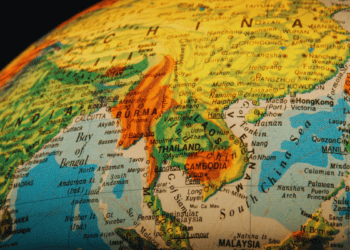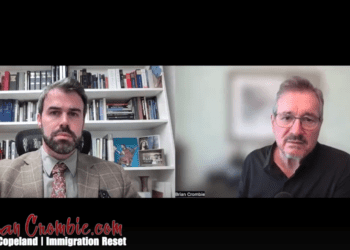
It is delusional to think there are substitutes for NAFTA in determining Canada’s place in the international trading system, writes Philip Cross in the Financial Post.
By Philip Cross, Mar. 16, 2018
President Donald Trump’s threat to hit Canada with duties on steel and aluminum increases the pressure on the federal government to come to a deal on NAFTA. The Trudeau government pretends there are alternatives to a failure of these talks, such as the recently concluded deal with 10 Pacific countries and the start of negotiations with the Mercosur trading group in Latin America.
It is delusional to think there are substitutes for NAFTA in determining Canada’s place in the international trading system. While more trade overseas is always welcome, we are fundamentally and inextricably part of the North American trading bloc and our relationship with the US will continue to drive Canada’s trade future. Our place in North American trade reflects both the rules governing trade and our ability to compete within those rules. Emphasizing “progressive” trade without an awareness of its costs worsens our competitiveness, the key determinant of our ability to successfully engage in trade. Negotiating trade deals while ignoring our cost structure is the ultimate bad trade strategy.
It is delusional to think there are substitutes for NAFTA in determining Canada’s place in the international trading system.
Three regions dominate the network of supply chains that trade in intermediate inputs: Europe, North America and East Asia. It is a misleading to say there are global supply chains, notes economist Richard Baldwin in his book The Great Convergence. While raw materials such as crude oil and finished goods like smartphones are shipped around the world, producer supply chains tend to be highly regional. Latin America and Africa are not part of any major regional supply chain, one reason why their development lags and our joining Mercosur would be pointless.
Each of the three main regions has wealthier countries where supply chains are designed and controlled, and low-wage countries that produce goods with less value added. Western European producers, notably Germany, outsource to low-wage countries in Eastern Europe. Richer Asian nations such as Japan and Australia contract out parts of their production process to low-wage countries such as China, Vietnam and Thailand. The outsourcing is done to nearby countries and not overseas to save on the cost of moving people (notably managers overseeing production), which is still high relative to the cost of moving goods.
Canada’s role in the North American supply chain has changed markedly over time, a reflection that cost competitiveness is as important as the rules governing trade. In the years after the original 1988 Free Trade Agreement with the US, before Mexico joined, Canada became the de facto low-cost producer for the US. Our steadily declining exchange rate led to the rapid expansion of export industries producing cheap consumer goods in Canada. The lower dollar helped lower the cost of producing in Canada enough that not even the 1995 entry of Mexico into NAFTA slowed the growth of these industries in Canada — a risky bet that depended too much on maintaining a low cost structure and a weak loonie.
Canada’s place in the North American supply chain changed significantly — and for the worse — when its cost structure began to rise rapidly after 2002 as the Canadian dollar returned to parity with American dollar and governments in Canada raised labour and energy costs and increased environmental regulations. Producers in low-wage consumer-goods industries such as clothing and furniture soon began disappearing or moving abroad. What remained in Canada’s manufacturing sector were resource-based industries and capital goods, both of which pay high wages, along with some surviving assets in the auto industry.
Canada’s changing role in the North American supply chain helps clarify what is at stake in the current blizzard of negotiations and deals involving Europe, Asia and the NAFTA partners. While trade deals with Europe and Asia have some importance to our producers of natural resources and our consumers of imports, we will simply never be an integral part of the European and Asian supply chains. Canada is simply too remote and has too high a cost structure.
Canada’s changing role in the North American supply chain helps clarify what is at stake
That means Canada’s future lies in finding its proper niche in the North American supply chain. Even with the loonie’s devaluation after 2014, exports have stagnated because our high cost structure and low productivity increasingly limits our role to producing raw materials, buying finished goods and supplying high-cost capital goods such as aerospace and high-tech equipment. This underscores the fundamental importance of both a successful renegotiation of NAFTA and lowering our costs. We cannot be fooled into thinking that trade deals with Europe and Asia will ever replace our need to successfully integrate into the North American production process.
Concluding trade deals between Canada and other nations is complicated by the Trudeau government’s fixation on “progressive” trade issues such as higher labour and environmental standards and social goals related to gender and Aboriginals. All of these inevitably raise our cost structure, so it is easy to see why Canada wants other countries to commit to the progressive trade agenda or we risk losing even more cost competitiveness. By the same token, it is obviously in the interest of other countries to encourage Canada’s fanciful pursuit of these policies while paying only lip service themselves. This is why progressive trade was only a non-binding side deal to the TPP and a non-starter in Canada’s talks with both China and the US The Trudeau government says it will not sign a bad trade deal. Agreeing to trade deals while unilaterally saddling our businesses with higher costs would be worse.
Philip Cross is a Munk Senior Fellow at the Macdonald-Laurier Institute.




